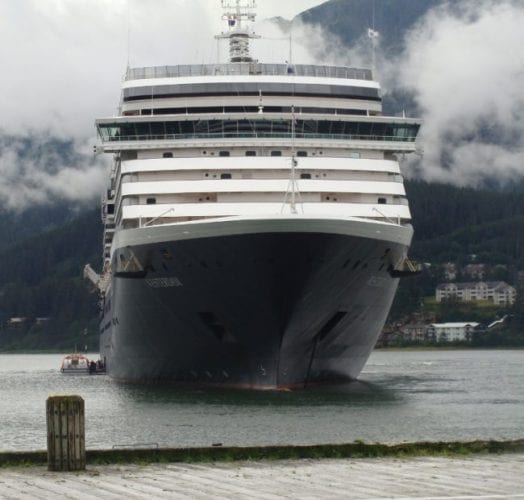
Petersburg’s borough assembly this week came out in support of the Ocean Rangers program for monitoring cruise ship waste water discharges and against legislation to repeal that type of independent monitoring for larger ships.
Bills in the state legislature would repeal the Ocean Rangers, independent observers riding onboard large cruise ships. The program was approved by voters in 2006 but Governor Mike Dunleavy has vetoed money for it and requested the change in state law.
Assembly member Jeff Meucci supported Petersburg’s resolution in favor of funding for the program.
“While it might be an inconvenience for the big cruise ships, it’s a vital tool for the waters of Southeast where a lot of our community members, small business owners spend a lot of time on the water, fishing and showing people what’s cool about Southeast Alaska,” Meucci said.
Proposed bills would eliminate a citizen’s right to sue companies for illegal dumping. They would allow for inspection of ships by state regulators but rely on the companies to monitor their own discharges. The bills would create an environmental compliance fee for companies, and those could be reduced for ships that have installed an electronic monitoring system.
Petersburg’s resolution highlights the importance of Southeast Alaska’s water quality, commercial harvest of seafood, and notes the increase in cruise ship traffic in the region. It says the proposed bills will not improve compliance with environmental regulations for discharges.
Vice mayor Jeigh Stanton Gregor said the Ocean Rangers program worked and he did not think the state’s Department of Environmental Conservation had a good history of policing the industry.
“House bill 303 and senate bill 180 I think further eviscerate the ability for DEC to get involved even if they were so inclined,” Stanton Gregor said. “I hope many communities attempt to pass resolutions such as this so we can send a strong message to our governor that the Ocean Ranger program and protecting our Southeast Alaska waters is vitally important.”
The onboard independent monitors approved by voters in 2006 are for ships with over 250 passengers. Most visiting Petersburg are smaller than that. However discharges by those smaller boats have also upset local officials and fishermen. And commercial fishermen have complained about permitted discharges they’ve observed from larger vessels around the Inside Passage during the cruise season.
The vote was unanimous to approve that resolution. Other communities have passed similar statements and it’s not the first legislature to review Dunleavy’s proposed change to state law. This year’s legislation has had a couple hearings.
Randy Bates, director of the DEC’s division of water, told the Senate resources committee in February that onboard observers are not the best use of money. He said the program, funded by fees charged to cruise companies, cost around 3.5 million dollars a year for 12 years.
“We feel at this point that the Ocean Rangers served a purpose,” Bates said. “There were no gaps in our enforcement or our coverage that they provided and we felt that at this point it was better that we move on from Ocean Rangers. We have a clear, robust, rigorous program with our inspectors and our marine engineers and we think that that is the most effective way to continue to manage the industry.”
The DEC also presented water quality sampling results from Alaska ports and common ship corridors started in 2015. The state agency reported higher levels of bacteria around municipal harbors even in 2020, a year without any cruise ship visits. Some state law makers are turning their focus on municipal sewage plants that also discharge in Alaska waters. The proposed legislation would create a new grant fund to help municipalities upgrade sewage treatment but cities say that’s likely only to cover a small portion of the cost.









